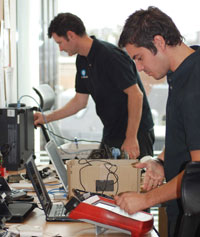Accreditation And Memberships
 ISO 9000 Quality Management
ISO 9000 Quality Management
ISO 9000 is the internationally recognised standard for an organisation's internal Quality Management. The term 'quality' refers to all those features of a product or service which are required by the customer. An organisation's 'Quality Management' refers to an organisation's actions to ensure that its products or services satisfy its customers' quality requirements and complies with any regulations applicable to those products or services.
 Constructionline
Constructionline
Constructionline is the UK's largest certified pre-qualification database, saving the construction industry over £500 million a year in administration. Already used by over 60% of local authorities, they reduce duplication and save time and money by encouraging organisations to use a single source for pre-qualification.
 SAFEcontractor
SAFEcontractor
SAFEcontractor is a health & safety accreditation scheme for contractors. It simplifies the process of demonstrating to clients that health & safety policies and procedures are in place. Clients have a legal obligation to ensure that contractors operate in a safe way. There is a need to assess contractors' health & safety arrangements, and increasingly this is being carried out through the SAFEcontractor scheme. Many large organisations now use SAFEcontractor as their primary means of selecting contractors.
 Contractors Health & Safety Assessment Scheme (CHAS)
Contractors Health & Safety Assessment Scheme (CHAS)
Over the years local authority health and safety and procurement professionals, with the support of the Health and Safety Executive, have developed the Contractor Health & Safety Assessment Scheme (CHAS). The scheme is available for use by any public and private sector organizations to use when shortlisting contractors, suppliers and consultants who apply to work for them. It provides information about the health and safety part of their application. Companies apply to join the scheme so everyone knows they meet acceptable standards of health and safety compliance. Clients from both the public and private sectors are users of the scheme and database.
 British Institute of Facilities Management (BIFM)
British Institute of Facilities Management (BIFM)
The British Institute of Facilities Management is the UK's lead institute representing the interests of those who practice facilities management and those who work in organisations supplying facilities management related products or services. Since its formation in 1993, the BIFM has remained the fastest growing professional body in the United Kingdom and is the largest national FM organisation in the world. Most of its members are individual professionals and there is a growing corporate membership.
 Royal Society for the Prevention of Accidents (RoSPA)
Royal Society for the Prevention of Accidents (RoSPA)
RoSPA's mission is to save lives and reduce injuries. The Royal Society for the Prevention of Accidents is a registered charity established over 80 years ago and aims to campaign for change, influence opinion, contribute to debate, educate and inform - for the good of all. By providing information, advice, resources and training, RoSPA is actively involved in the promotion of safety and the prevention of accidents in all areas of life - at work, in the home, and on the roads, in schools, at leisure and on (or near) water.
 Electrical Safety Council
Electrical Safety Council
The Electrical Safety Council is an independent non-profit-making organisation, registered as a charity, set up to protect the safety of consumers. Supported by all sectors of the electrical industry as well as local and central government, the Council deals with all electrical safety matters on behalf of consumers. The Council is a driving force in the field of electrical safety for the protection of consumers, working with other organisations to improve standards and promote best practice. Portable Appliance Testing The Council's remit is reflected in its mission, which is: To reduce electrical accidents and injuries. The Electrical Safety Council intends to fulfill its mission through activities, collaborations and partnerships so that consumers' needs on issues of electrical safety are given the appropriate priority.
 Institution of Engineering and Technology (IET)
Institution of Engineering and Technology (IET)
Formerly the Institution of Electrical Engineers and Institution of Incorporated Engineers, the Institution of Engineering and Technology is one of the world's leading professional societies for the engineering and technology community. The IET has more than 150,000 members in 127 countries and has offices in Europe, North America and Asia-Pacific. The Institution provides a global knowledge network to facilitate the exchange of knowledge and ideas and promotes the positive role of Science, Engineering and Technology in the world. The IET represents the engineering profession in matters of public concern and assists governments to make the public aware of technological issues. It also provides advice on all areas of engineering, regularly advising Parliament and other agencies.
City & Guilds Qualifications
The Electricity at Work Regulations require electrical systems to be maintained to prevent danger. The Regulations include all electrical equipment which can be connected to a source of electrical energy and which may cause personal injury. Such equipment can take the form of electrical/electronic appliances, tools, heating apparatus and test instruments, etc. A number of Health and Safety Executive documents, BS and BS EN publications, the Electricity at Work Regulations and IEE Code of Practice for In-service Inspection and Testing of Electrical Equipment and the IEE Electrical Maintenance document may be referred to for authoritative guidance on maintenance procedures. The City & Guilds 2377 "Certificate for In-service Inspection and Testing of Electrical Equipment" course is designed to ensure that practising electricians or others responsible for the maintenance of electrical equipment are familiar with the use of the Institute of Electrical Engineer's code of practice, for in-service inspection and testing of electrical equipment.


